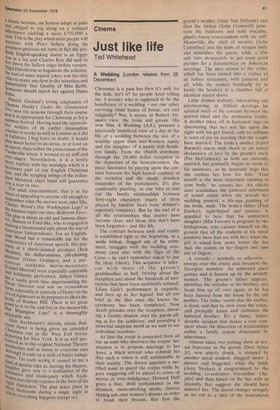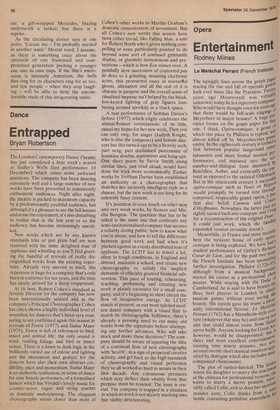Cinema
Just like life
Ted Whitehead
A Wedding (London release from 28 December) Christmas is a pain but then it's only for the kids, isn't it? So people keep telling me. I wonder who is supposed to be the beneficiary of a wedding — our one other surviving ritual beano of booze, sex and religiosity? Not, it seems, in Robert Alt man's view, the bride arid groom. His new film, A Wedding. (AA), presents a hilariously jaundiced view of a day in the life of a wedding between the son of a wealthy upper class mid-Western family and the daughter of a newly rich Southern family. From the church ceremony through the 20,000 dollar reception to the departure of the honeymooners, the piece fascinates by playing upon the contrast between the high formal courtesy of the occasion and the randy, drunken escapades of the participants. It's also continually puzzling, as one tries to sort out the family relationships between forty-eight characters (many of them played by familiar faces from Altman's repertory company). But by the end of it all the relationships that matter have become clear, and those that don't have been forgotten — just like life.
The contrast between style and reality is established right at the beginning, as a senile bishop, dragged out of his retirement, struggles with the wedding ceremony (and also with the Sign of the Cross — he can't remember where to put the Holy Ghost). This sequence is intercut with shots of the groom's grandmother in bed, fretting about the reception and about the hundreds of invitations that have been snobbishly refused; Lilian Gish's performance is exquisite, and lives up to her legend, but all too brief as she dies once she knows the ceremony has been completed. Now death presides over the reception, throwing a Gothic shadow over the guests piling in for the jamboree, and providing a powerful suspense motif as we wait to see individual reactions.
At first the event is concealed from all but an aunt who discovers the corpse: her reaction is to propose marriage to her lover, a black servant who reminds her that such a union is still unthinkable in their society. The doctor appoints a terrified maid to guard the corpse while he goes staggering off to attend to crises of nerves or over-indulgence; Howard Duff gives a fine, droll performance as the drunken, chain-smoking medic, forever tipping ash onto women's dresses in order to brush their breasts. But first the groom's mother (Nina Van Pallandt) and then the bishop (John Cromwell) penetrate the bedroom and hold macabre. ghastly-funny conversations with the stiff. Meanwhile the chief of security (John Considine) and his team of viragos bully and intimidate the guests, while a film unit tries desperately to get some good pictures for a documentary on American marriage. The men retreat to the cellar, which has been turned into a replica of an Italian restaurant, with guitarist and all, while the women frantically try to locate the lavatory in a chamber full of identical mirror doors.
Little dramas multiply, intercutting and interweaving, as Altman develops his satirical study of the contrast between the marital ideal and the permissive reality. A mother takes off in hysterical rage on discovering that her son has spent the night with his girl friend, only to collapse in tears of joy on learning that the couple have married. The bride's mother (Carol Burnett) reacts with shock to an ardent declaration of love by the groom's uncle (Pat McCormick), as both are currently married, but gradually begins to warm to his insistence, as he fatuously begs that she confess her love for him. Your mouth is the most important opening in your body,' he assures her. An elderly aunt scandalises the gathered celebrants of sexual union when she reveals her wedding present, a life-size painting of the bride, nude. The bride's father (Paul Dooley), tight-lipped and puritan, is appalled to hear that his unmarried daughter (Mia Farrow) is pregnant by the bridegroom, who excuses himself on the ground that all the students at his naval academy have had sex with her; when the girl is asked how many lovers she has had, she counts on her fingers and runs out of fingers.
A tornado — symbolic or otherwise — sweeps over the estate and threatens the Georgian mansion. An uninvited guest arrives and is beaten up by the security women. The groom's father appears, identifies the intruder as his brother, and beats him up all over again, as he has been banned from the house by the old mother. The father learns that the mother is dead, and that he now owns the estate, and promptly kisses and embraces the battered brother. It's a funny, unpredictable incident that makes a sour comment about the distortion of relationships within a family system dominated by inheritance.
Altman takes two parting shots at sexual hypocrisy as the groom (Desi Arnaz Jr), now utterly drunk, is stripped by another naval student, dragged under a shower and buggered, while the bride (Amy Stryker) is congratulated by the wedding co-ordinator (Geraldine Chaplin) and then kissed on the lips with an intensity that suggests she should have married her. The mood changes savagely as we cut to a shot of the honeymoon car, a gift-wrapped Mercedes, blazing underneath a tanker; but there is a reprise.
As the circulating doctor says at one point, 'Excuse me — I'm probably needed in another ward.' Mental ward, I assume, as there is something crazy about the spectacle of one frustrated and compromised generation pushing a younger one into its own traps. If the film's microcosm is intensely American, the bells that ring for its characters ring for us too, and few people — when they stop laughing — will be able to deny the uncomfortable truth of this invigorating satire.























































 Previous page
Previous page